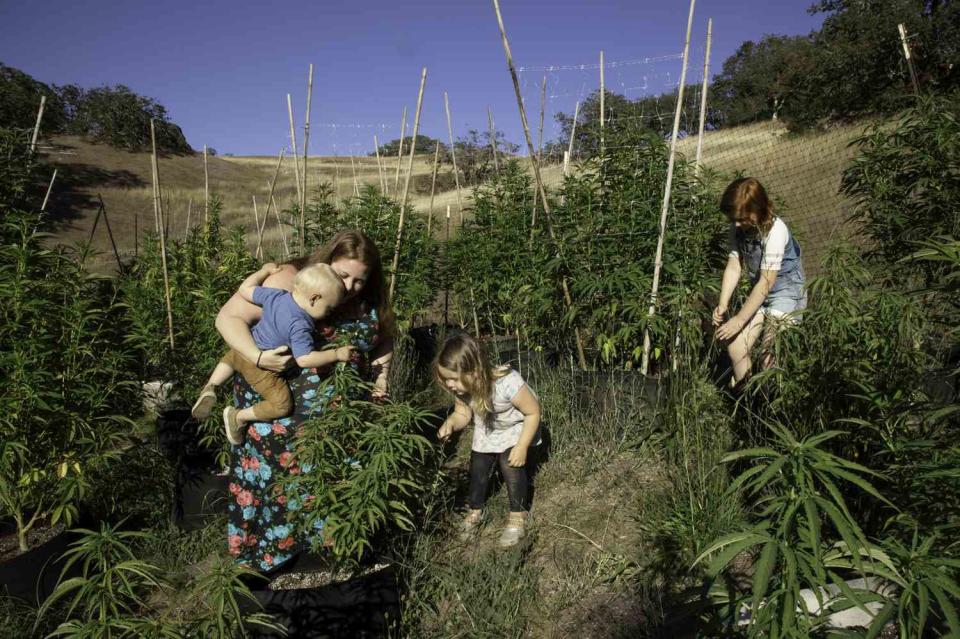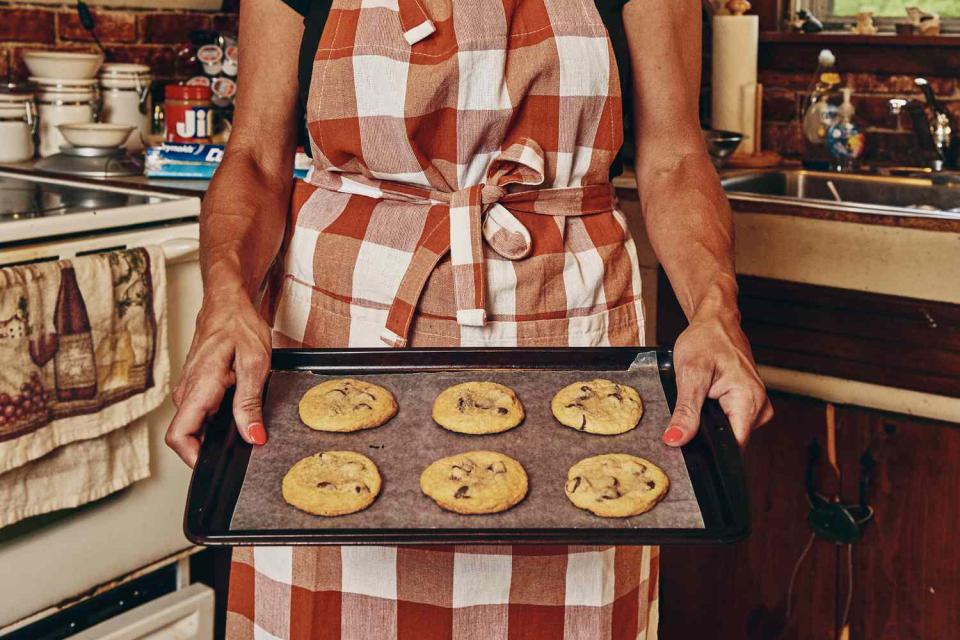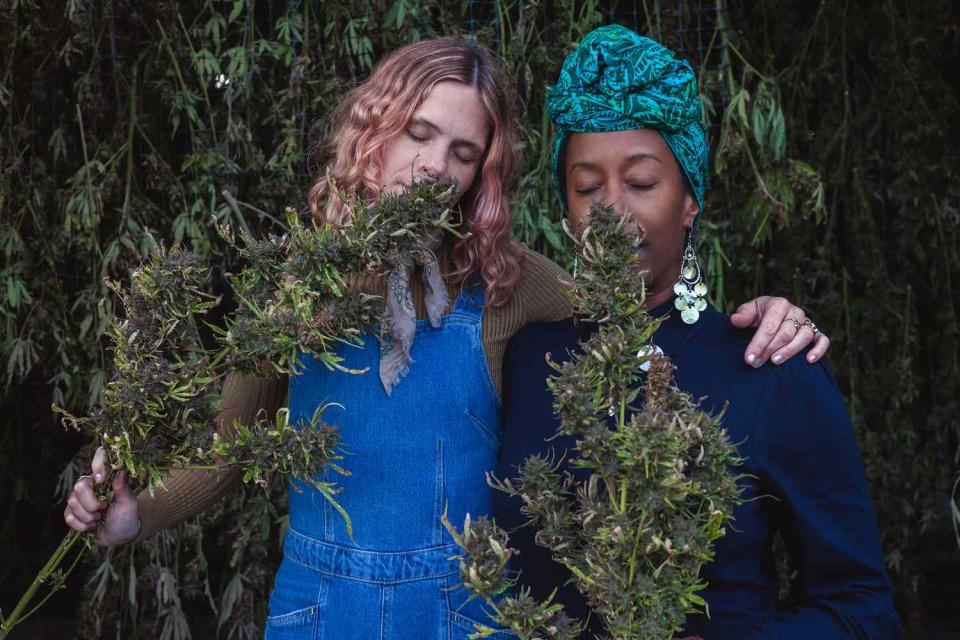Why Moms Are Pioneering the Marijuana Industry
Kelley Bruce first began using marijuana as an alternative to pharmaceuticals. It helped ease the symptoms of her ADD and major depressive disorder, as well as soothe the chronic pain she’s endured in her neck and back ever since a car accident left her with a herniated disc. “I choose cannabis versus five pills a day,” she says. “I truly believe it’s a powerful plant.”
The mother of three with a fourth on the way has made it her mission to help other moms suffering in similar ways by launching a cannabis cultivation non-profit called CannaMommy. The company, based in Humboldt County, California, where Bruce and her family live, sells a variety of CBD products, including bath bombs, salts, and lactation cookie kits. It’s also a “safe place” for mothers and families to find information about cannabis in order to make the best choices for them regarding using plant-based solutions. “I love being able to help people who are suffering end their pain—that’s my biggest joy,” says Bruce, whose children are well aware of her business and are often right beside her as she works.
Bruce is just one of more than 200,000 people, including legions of moms, who are finding work within both the recreational and medical cannabis industry. Because the industry is so new, there's endless room for development in nearly every sector—sales, marketing, cultivation, science, legal, and administrative. The glass ceiling that so often exists for women in other industries isn’t as much of an issue in the cannabis world. Mothers are taking on roles from the ground floor up, and in fact, hold about 27 percent of executive roles in cannabis companies compared to 21 percent in traditional industries.
The booming industry comes in response to the breakthroughs in legalization across the country. At the time of publication, marijuana is medically legal in 33 states. And it’s recreationally legal in Washington D.C. as well as Alaska, California, Colorado, Illinois, Maine, Massachusetts, Michigan, Nevada, Oregon, Vermont, and Washington. In most of these states, it is also legal to grow between plants for personal use and there are typically limited restrictions for those with a commercial grower’s license. Elsewhere, advocates are pushing for imminent legalization.

Amy Kumler for Parents.com Kelley Bruce holding Boston, 18 months, with Winter Avery, 9, and Sloan, 3.5, at Lagniappe Farms in Humboldt County, California, August 23, 2019.
Benefits for Moms in Marijuana
Bruce enjoys the perks of setting her own hours and working near home so she is available to her children. Other women who started "cannabusinesses,” as some moms in the field refer to them, also find a work/life balance that doesn't often exist in more traditional industries.
Tommie S., a stay-at-home mother of three near Worcester, Massachusetts, started her own edibles business from her kitchen. (Though she works in a legal state, Tommie chooses to only share her first name to avoid judgment from neighbors.) She first became interested in using and working with cannabis since it helped her anxiety. “My anxiety was at an all-time high and I felt like I was drinking too much to cope,” she says. “Edibles calmed me without the effects of alcohol and helped me to lose 85 pounds of post-baby weight. I went from 210 to 130 pounds by abstaining from alcohol.” She now bakes THC-infused treats, such as Snickerdoodles, chocolate chip cookies, and peanut butter truffles, in her own kitchen, then vacuum seals and delivers them to her customers.

Tony Luong for Parents.com Tommie S. in her kitchen as she bakes THC-infused treats.
"I love to cook, so this is right up my alley," says Tommie. "I also love that I can help contribute to our household income without leaving the house."
Tommie’s kids, ages 7, 5, and 3, are in the public school system but they are usually home while she works. “My kids do not help but are home much of the time I bake,” says Tommie. “I tell them they are medicine cookies for my friends that need them. They see me baking, cooking, and cooling them.”

Tony Luong for Parents.com Tommie S. holds a tray of THC-infused chocolate chip cookies.
Other mothers find that working in cannabis allows them to shape the growth of a new industry. Melanie Sylvan Sachs, 42, a former account director with Siegel+Gale, is now co-founder and chief strategist of Green Seeds Creative, a branding, marketing, and product development agency that cultivates and grows cannabis and green beauty brands.
Sylvan Sachs, who has a 2-year-old son Elias, studied the industry for a few years before entering the space in 2018. "Being a yoga teacher and student, an ever-learning mom, an environmentalist, and a wellness advocate has provided me with a lot of knowledge in the green space," she says. "I believe in the healing power of food, exercise, green beauty, and natural wellness, including cannabis."
She also enjoys that her co-workers and clients are supportive, welcoming, and inspiring. "The industry is made up of progressive, creative, innovative, hard-working people, and those are the people with whom I want to surround myself, both in work and out," she says.

Mary Beth Koeth for Parents.com Melanie Sylvan Sachs and her son Elias, 2, at their home in Windermere, FL.
Women feel safer working in the cannabis industry, reporting fewer cases of sexual harassment compared to women in other industries, according to the Diversity In Cannabis report. And the potential financial benefit for women is worth noting, as well. CBD-based products are veering into the health and wellness arena, a traditionally female-dominated market that was valued at $4.2 trillion dollars in 2017, according to the Global Wellness Institute.
RELATED: Is CBD Oil Safe for Kids?
Overcoming Stigma
Cannabis businesses in legalized states are as legitimate as any other businesses, but not all moms are supported in their work. When Kelley Bruce first launched CannaMommy, she faced some scrutiny from family members and neighbors who did not think a mother should be working with THC. "Child Protective Services was called on our family, I think by the neighbors, but CPS doesn’t tell you who filed the report,” she says. "They have to investigate every report by law though, so they came and spoke to our daughters, looked in our home, interviewed us, and came to the conclusion that our children were not in any danger and there was zero neglect going on."
Another family in Oregon who legally grows medical cannabis had their 1-year-old daughter taken from their home by CPS due to the results of an investigation that found the home to be unsafe for children. They were able to get the child back, proving that the investigation findings were wrongful and inaccurate, but not without a long, stressful court battle.
Explaining Cannabis Work to Children
Unlike accountants and lawyers, moms who have careers in cannabis can’t always come home at the end of a long day and easily explain what they do at work to their kids. These aren’t jobs kids learn about in school, after all.
"I have four girls aged 5 to 10, and they all know the word ‘cannabis,’ but don’t necessarily know what it means,” says Rosie Mattio, founder and CEO of MATTIO Communications. She describes her company as the largest cannabis marketing firm in the industry. "When I asked my 9-year-old if she knew what cannabis was, she answered, 'That thing you paint on!’ She thought the word was the same as ‘canvas.’”

Didem Civginoglu Danniel Swatosh and her Humble Bloom business partner Solonje Burnett
Other parents teach their children about the plant they work with and are proud to have their children understand the medical benefits of the industry they are working in. “My children have been witnesses to the growth of my company as my house served as my company's headquarters for the first seven months,” says Danniel Swatosh, who runs Humble Bloom along with her business partner Solonje Burnett. “I believe in being authentically myself and radical honesty, so my children are well aware of the plant and her potential to heal our bodies as well as our communities.” And her children are very supportive. “They think that we’re saving humanity and are ready to join in solidarity,” says Danniel. "My daughter even once walked into a room and announced, "I am a cannavist.’"
No matter their background, race, education, work experience, or family makeup, these women have all found cannabis to be one workplace that has made room for each of them on their own terms. Here, mother nature and mother pair up to symbiotically provide.

